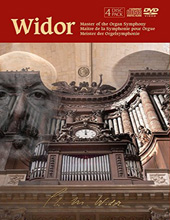
ESSENTIAL RECORDINGS

Symphonie No. 6 - Gerard Brooks, Cathédrale Sainte-Croix d'Orléans
Symphonie No. 1 (Méditation) - Daniel Roth, Saint-Sulpice, Paris
Symphonie No. 3 (Prélude et Finale) - Daniel Roth, Saint-Sulpice, Paris
Symphonie No. 2 (Adagio) - Daniel Roth, Saint-Sulpice, Paris
Symphonie No. 5 - Gerard Brooks, Abbatiale Saint-Ouen, Rouen
Symphonie Gothique (Andante sostenuto) - Gerard Brooks, Abbatiale Saint-Ouen, Rouen
Symphonie No. 7 (Choral et Finale) - Daniel Roth, Saint-Sulpice, Paris
The CDs alone in this 4-Disc Pack are well worth the price of admission. Charles-Marie Widor's Organ Symphonies are highly dramatic and deeply expressive works, and
organist Gerard Brooks certainly brings those exact qualities to the forefront in his thrilling account of the impressive Symphonie No. 6.
The intensity of the first movement alone had me returning over and over again for just one more listen, and never failed to impress me. Mind you, the organ of Sainte-Croix plays a large role
in the "blow your mind" side of things, with plenty of headroom and unbelievable power. You'll know exactly what I mean once you listen to the second most famous Toccata
after the Bach D Minor, the one that ends the Symphonie No. 5. I've played that one myself many times on some great organs and listened
to countless recordings of it and I tell you, this performance is so virtuosic and powerful, it's scary. And then just as moving are the Adagio and
Cantabile movements from No. 6 in their soft and lyrical character. And in a 'live' recording from Saint-Sulpice, Daniel Roth delivers a superbly expressive
reading of the Adagio from Symphonie No. 2.
And if that wasn't enough the set also includes one DVD that features all the video footage of these great pieces where you can see and hear these great instruments at work and the
organists that have harnessed their power. The second DVD contains a detailed documentary on Widor's life and work, expertly narrated by these organists and some Widor scholars, all set
and recorded in the pews of the churches where the composer spent his entire life, adding a deeply personal feeling to the film. At the end of it all you are left with the profound impression that
being a composer and organist during that era was not only a job, it was a way of life.
Below is a video clip of the first 10 minutes of this documentary film.
Jean-Yves Duperron - February 2016